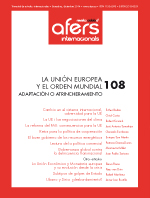Introducción: cambio en el sistema internacional, adversidad para la UE
Palabras clave:
UE, sistema internacional, multilateralismo, estructura de poderResumen
Revista CIDOB d’Afers Internacionals, nº 108
Cuatrimestral (septiembre-diciembre 2014)
ISSN:1133-6595 | E-ISSN:2013-035X
En el actual contexto de cambio delsistema internacional, este artículo introductorio construye un marco analítico para operacionalizar el cambio en la estructura de poder (una tipología de estructuras internacionales y sus combinaciones) y para estudiar cómo se comporta la UE frente a la adversidad que introduce el cambio a través de su actuación en las instituciones multilaterales (estrategias de adaptación y de atrincheramiento). Basándose en dicho marco, la autora presenta los seisartículos que configuran el monográfico, los cuales se interrogan sobre la reacción de la UE en distintas instituciones multilaterales de ámbitos diversos (economía, medio ambiente,energía y seguridad), entendiendo las institucionesen sentido amplio (conjuntos persistentes y conectados de reglas).
Citas
Acharya, Amitav. Rethinking power, institutions and ideas in world politics. Londres: Routlege, 2014.
Aggestam, Lisbeth. «Role theory and European foreign policy», en: Elgström, Ole y Smith, Michael (eds.) The European Union’s Roles in International Politics: Concepts and Analysis. Londres y Nueva York: Routledge, 2006, p. 11-29.
Barbé, Esther. «The EU in an unsettled international system. Leading by example?». Paper presentado a la 8th Pan-European Conference on InternationalRelations (Varsovia, 18-21 septiembre 2013).
Barbé, Esther (dir.) Cambio mundial y gobernanza global: La interacción entre la Unión Europea y las instituciones internacionales. Madrid: Tecnos, 2012.
Barbé, Esther. «Multilateralismo: Adaptación a un mundo con potencias emergentes». Revista Española de Derecho Internacional, vol. LXII, n.º 2 (2010), p. 21-50.
Barbé, Esther; Herranz-Surrallés, Anna y Natorski, Michael. «Model, Player or Instrument for Global Governance. The Discourse and Practice of Metaphors in EU Foreign Policy», en: Carta, Caterina y Morin, Frederic (eds.) EU’s Foreign Policy through the Lenses of Discourse Analysis: Making Sense of Diversity. Aldershot: Ashgate, 2014a, p. 111-132.
Barbé, Esther; Costa, Oriol; Herranz-Surrallés, Anna y Kienzle, Ben. «The EU in an unsettled international system: Coping with the power shift in global governance». Paper presentado en la Conferencia de la International Studies Association (ISA), Toronto (Canadá), 26-29 de marzo de 2014b (en línea) http://www.eu-ianus.eu
Barnett, Michael y Duvall, Raymond. «Power in International Politics». International Organization, vol. 59, n.º 1 (2005), p. 39-75.
Bennett, Leroy y Oliver, James K. International Organizations: Principles and issues. Englewood Cliffs: Prentice Hall, 2003.
Blavoukos, Spyros y Bourantonis, Dimitris. «Introduction. The EU presence in international organizations», en: Spyros Blavoukos y D. Bourantonis (eds.) The EU Presence in International Organizations. Londres: Routledge, 2011, p. 1-15.
Bretherton, Charlotte y Vogler, John. «A global actor past its peak?». International Relations, vol. 27, n.º 3 (2013), p. 375-390.
Buzan, Barry y Lawson, George. «Capitalism and the emergent world order». International Affairs, vol. 90, n.º 1 (2014), p. 71-91.
Carlsnaes,Walter. «The Agency-Structure Problem in Foreign Policy Analysis». International Studies Quarterly, vol. 36, n.º 3 (1992), p. 245-270.
Costa, Oriol y Jorgensen, Knud E. (eds.). The influence of International institutions on the EU. When Multilateralism hits Brussels. Londres: Palgrave, 2012.
Cox, Robert W. «Social forces, states and world orders: beyond international relations theory», en: Cox, Robert W. y Sinclair, Timothy J. Approaches to World Order. Cambridge: Cambridge University Press, 1996 [1981].
Fergusson, Niel. «A world without power». Foreign Policy (julio/agosto de 2004).
Grevi, Giovanni. «The interpolar world: A new scenario». ISS Occasional Paper, n.º 79 (junio de 2009).
Haas, Richard. «The age of non-polarity. What will follow US dominance». Foreign Affairs, vol. 87, n.º 3 (2008), p. 44-56.
Holsti, Kal J. Taming the sovereigns. Institutional change in International Politics. Cambridge: Cambridge University Press, 2004.
Johansson-Nogués, Elisabeth. «The Decline of the EU’s magnetic attraction? The European Union in the Eyes of Neighbouring Arab Countries and Russia». LSE European Foreign Policy Unit Working Paper, n.º 1 (2011).
Jorgensen, Knud Erik (ed.). The European Union and International Organisations. Londres: Routledge, 2009.Keohane, Robert. International Institutions and State Power: Essays in International Relations Theory. Boulder: Westview Press, 1989.
Kissack, Robert. Pursuing effective multilateralism: The European Union, International Organisations and the Politics of Decision Making. Londres: Palgrave, 2010.
Kupchan, Charles A. No One’s World. The west, the rising rest and the coming global turn. Oxford: Oxford University Press, 2012.
Laïdi, Zaki. Norms over Force: The Enigma of European Power. Nueva York: Palgrave Macmillan, 2008.
Lavenex, Sandra y Schimmelfennig, Frank. «EU rules beyond EU borders: theorizing external governance in European politics». Journal of European Public Policy, vol. 16, n.º 6 (2009), p. 791-812.
Mahbubani, Kishore. The great convergence. Asia, the west and the logic of one world. Nueva York: Public Affairs, 2013.
Manners, Ian. «Normative power Europe reconsidered: beyond the crossroads». Journal of European Public Policy, vol. 13, n.º 2 (2006), p. 182-199.
Manners, Ian. «Normative Power Europe: A Contradiction in Terms?». Journal of Common Market Studies, vol. 40, n.º2 (2002), p. 235-258.
Peterson, John. «José Manuel Barroso: Political Scientist, ECPR Member». European Political Science, n.º 7 (2008), p. 64-77.
Serfaty, Simon. «Moving into a Post-Western World». The Washington Quarterly, vol. 34, n.º 2 (2011), p. 7-23.
Sinclair, Timothy J.«Beyond international realtions theory», en: en: Cox, Robert W. y Sinclair, Timothy J. Approaches to World Order. Cambridge: Cambridge University Press, 1996 [1981], p. 1-18.
Smith, Karen. «Can the European Union be a Pole in a Multipolar World?». The International Spectator, vol. 48, n.º 2 (2013), p. 114-126.
Torreblanca, José Ignacio. La fragmentación del poder europeo. Barcelona: Icaria, 2011.
Youngs, Richard. Europe’s decline and fall. The struggle against global irrelevance. Londres: Profile Books, 2010.
Zakaria, Fareed. The post-american world. Londres: W.W. Norton & Company, 2008.













